The Nostalgia of Sword & Sandal Epics
Even as a very young viewer I was always disappointed in dubbed Italian "sword & sandal" epics. I wanted them to be way cool like Jason & the Argonauts (1963) with its swordplay action involving an army of skeletons, or The Vikings (1958) & Spartacus (1960) wherein scenery-chewing performances from the likes of Kirk Douglas made you believe these heroic figures were real & vital, or Ben Hur (1959) with Charlton Heston's angsty scenery chewing & omigod look at that poor bastard skinned alive in the chariot race.
By comparison the wooden performances of a Steve Reeves or Reg Park in simply awful stories left me puzzled, for mythology was thrilling & magical but these films weren't. As a kid I just never understood that the only "point" was oiled muscles. Perhaps because Mike, my Greek step-dad, had oiled muscles, there was no reason for me to consider that aspect of these films unique. I wanted the point to be history & mythology & cool stories of brutality & heroism & maybe even magic. Disappointments abounded.
Even so, as a sprite in the 1960s I watched the Saturday afternoon television program called Sons of Hercules which was a batch of unrelated Italian sword & sandal films packaged as a syndicated series, placing at the front of each "episode" a campy folksong that ran in part: "The mighty sons of Hercules/ Were men as men should be." Men should not only be buff muscle builders, but also (just like Mike) hairless & oiled & flexing on a stage.
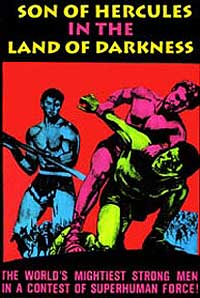 One film re-edited for the Sons of Hercules series was Son of Hercules in the Land of Darkness elsewhere known as Hercules the Invincible (Ercole l'Invincible, 1960). If the original Italian film was any good, it's hard to tell from this dubbed version, though chances are it was only marginally if at all better. One film re-edited for the Sons of Hercules series was Son of Hercules in the Land of Darkness elsewhere known as Hercules the Invincible (Ercole l'Invincible, 1960). If the original Italian film was any good, it's hard to tell from this dubbed version, though chances are it was only marginally if at all better.
Buffed & waxed Dan Vadis is likened a "son of Hercules" to fit the series, but as near as I can tell, in the Italian original he really was supposed to be Hercules, i.e. Ercoles, which has been Englished as Argoles. Vadis has a sweeter screen presence than most of the muscle men to tackle sword & sandal roles. He became pals with Clint Eastwood on sets of spaghetti westerns & ended up in American films produced or directed by Eastwood.
In such formula ridden sword & sandal films, scenes tend to be interchangeable one movie to the next, so in the American edit, one of the key scenes, of Argoles' encounter with a dragon, was removed from the film & replaced with completely different dragon footage snatched from Pietro Francisci's Le Fatiche di Ercole (Labors of Hercules, 1958), so it's actually Steve Reeves in all but the close-ups in that sequence. This alas is the best sequence in the whole film, so Dan Vadis is shortchanged as a star. The "dragon" looks rather like Godzilla moonlighting between Japanese films, definitely a dinosaur & not a dragon. It is dispatched with a spear through the eye.
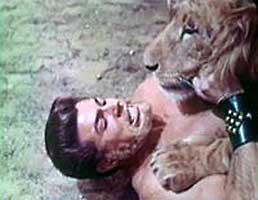 The film begins with Argoles in a lion fight that is quite appealing as cliche scenes in sword & sandal films go. The lion is obviously tame, but it's even so quite thrilling to watch Vadis instead of a stand-in wrastlin' a lion. The gentle lion was very tolerant being choked & pushed & even wacked in the side with a rubber boulder. There's a less impressive wrestling scene with a Malay sun bear later on. The film begins with Argoles in a lion fight that is quite appealing as cliche scenes in sword & sandal films go. The lion is obviously tame, but it's even so quite thrilling to watch Vadis instead of a stand-in wrastlin' a lion. The gentle lion was very tolerant being choked & pushed & even wacked in the side with a rubber boulder. There's a less impressive wrestling scene with a Malay sun bear later on.
It is surprising how many Sons of Hercules type films have long sequences set in cavernous places. I always loved the element of fantasy tossed into these tales, & got more enjoyment when they have mythological beasts & divinities & underground cities than when they tried to pose as "historical." But it's surprising how dull it can be wandering around having fights in caverns, though Star Trek episodes suffered from the same sort of cavernitis & I guess it's done because recreating an alien landscape, or the ancient world, is a lot tougher than showing the inside of a real or phony cavern.
Eventually the action of Hercules the Invincible moves exclusively into the rather tedious Land of Darkness, a cavernous world inside a lava-encircled mountain, inhabited by a subterranean race ruled by a Mean Queen who demands child sacrifices & slaves from the lit world. Argoles busts right in & begins at once to disobey the prime directive.
Argoles has his ups & downs interacting with the underground society. At first the queen wants him torn apart by elephants so her followers can eat his flesh & whoever eats his heart gets to be captain of her conquering hordes. When Argoles proves stronger than elephants & even wrastles with one elephant's leg looking like a horny puppy, the queen momentarily likes him.
Possibly due to being spurned in favor of a less powerful woman, or perhaps just for nosing around where he shouldn't, he's soon again her enemy. And how best to defeat one's enemy? Destroy their entire city along with everyone in it.
There's the comic relief easily frightened friend who follows Hercules around & eventually does some heroic stuff. Hercules defeats the queen's armies & carries the damsel to safety while lava flows through the caverns destroys her capital city of Denios & we must assume all the wives & innocent children who lived there, but Argoles did at least liberate the slaves (a few of them anyway) who follow him out of the destruction before he knocks over the bridge making sure none of the queen's race can escape alive. That's heroism for ya.
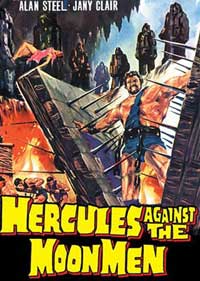 This is kiddy stuff all the way, not the worst film of its type, but with no intention of being any good either. The excellent soundtrack is often remarked upon. It should be transcribed for use in better epics. This is kiddy stuff all the way, not the worst film of its type, but with no intention of being any good either. The excellent soundtrack is often remarked upon. It should be transcribed for use in better epics.
Alan Steele is the beefcake icon playing Hercules in the unusually wacky heroic fantasy Hercules Against the Moonmen.
However, in the original Italian he is not Hercules but Maciste (Mah CHEE stay), a name which is a play on Machismo. Maciste is a standard muscle man hero of Italian cinema, going back to the silent era, but does not otherwise exist in history or mythology. Outside of Italy his name means very little, so being a Hercules clone to start with, Maciste films tend just to get Englished as Hercules films.
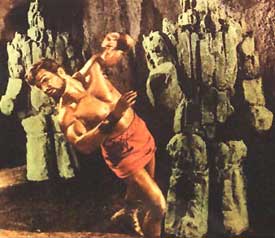 The film is also known as Hercules & the Queen of Samar or Maciste vs. the Moon Men. Absurd though the story is, the men made of stone whom Hercules battles are really quite interestingly designed, despite being amusing in appearance. The film is also known as Hercules & the Queen of Samar or Maciste vs. the Moon Men. Absurd though the story is, the men made of stone whom Hercules battles are really quite interestingly designed, despite being amusing in appearance.
The fact that director Giacomo Gentilomo regarded his career as a painter more important than directing may have a lot to do with the effectiveness of some of the film's design. That the film is even with some fine design rather stupid is likely why Gentilomo said screw it & retired from filmmaking in order to focus on his art.
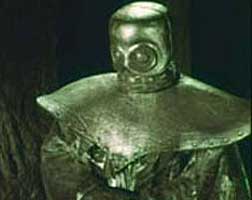 The evil queen of Samar has been providing child sacrifices to the moon people & their stone guards who live in the mountains. The evil queen of Samar has been providing child sacrifices to the moon people & their stone guards who live in the mountains.
Hercules has to overcome these invaders, besides defeating minions of Queen Zamara, & save the princess who we cannot help but suppose would be a nicer queen if Zamara could be usurped.
There's a protracted sandstorm padding out the center of the film, Zeus alone knows why anyone thought that would be interesting.
It's by no means convincing or well told but small children will be convinced, & the beefcake element is solid since there's no question but that Alan Steele is a hunk. The Mystery Science Fiction Theater 3000 version with puppet commentary will be preferred by all but Hercules purists.
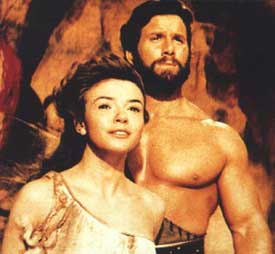 The title of Hercules & the Captive Women (1963, Ercole alla conquista di Atlantide, 1961) has exceedingly little to do with the film's story. A key sequence has a captive woman, singular, imbedded half in stone, whom Hercules rescues from her predicament. The film should otherwise have been left with its international title Hercules & the Conquest of Atlantis. The title of Hercules & the Captive Women (1963, Ercole alla conquista di Atlantide, 1961) has exceedingly little to do with the film's story. A key sequence has a captive woman, singular, imbedded half in stone, whom Hercules rescues from her predicament. The film should otherwise have been left with its international title Hercules & the Conquest of Atlantis.
If it is possible to get hold of the Italian version, it's fifteen minutes longer & makes a bit more sense. Otherwise the Mystery Science Fiction Theater 3000 version is good enough, as there's nothing here that's so effective that it would be a shame to listen to puppets making light of it.
Reg Park is Heracles in what amounts to a children's adventure that appeals also to adult fans of faggoty beefcake movies & similar high camp cinema.
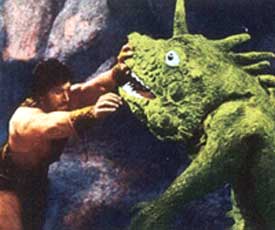 This one's better than most of the Heroic Fantasy Hercules films. Hercules saves the woman who was imbedded in stone by killing the master of the island, Proteus, who can take any form, but turns out to be killable in the form of a boxing horned six-foot dinosaur. Defeating lizard-boy requires Herc to grab the shlong sticking out of its head & ripping it off. This one's better than most of the Heroic Fantasy Hercules films. Hercules saves the woman who was imbedded in stone by killing the master of the island, Proteus, who can take any form, but turns out to be killable in the form of a boxing horned six-foot dinosaur. Defeating lizard-boy requires Herc to grab the shlong sticking out of its head & ripping it off.
The princess he saved is from Atlantis, daughter of a snarky queen who acts all happy to have her princess daughter back alive, but really wants her dead. The island's high priest, whose temple is a cavern containing a bubbly pool of "the blood of Uranus," does not need puppet commentary to be funny. This high priest does not approve of the Atlantean queen's desire to conquer the world so it will be him, rather than Hercules, who sinks Atlantis by exposing the the blood of Uranus to the sun.
Frankly, after the the shapeshifer Proteus gets his horn ripped off & dies, nothing else is even camp enough to be rewarding. But I do believe anyone under the age of ten, & perhaps a "slow" thirteen, would be captivated.
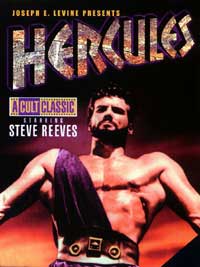 Steve Reeves is rightly remembered as the most impressive star to play Hercules, so it's surprising to realize he only played him twice. In his later film roles he didn't stay pumped up to such ultra-muscular size, so the two Hercules films show him at his physical height. Steve Reeves is rightly remembered as the most impressive star to play Hercules, so it's surprising to realize he only played him twice. In his later film roles he didn't stay pumped up to such ultra-muscular size, so the two Hercules films show him at his physical height.
He has genuine presence in the role & never looks the least bit silly in costume. His acting is adequate to the task & he brings a surprising degree of dignity to the sword & sandal genre, with sufficient beauty to overcome those elements of muscle-man movies that are masculine meat-market burlesques.
It's too bad the leading ladies aren't a bit more convincingly ancient-world & a lot less 1950s & 1960s pin-up girls. Had they been costumed in any manner approaching authentic, Reeves' films might have risen above "unexpectedly good for fetishistic kitsch." Instead, the sexism is so extreme that all but the most sensitive will find it not so much offensive as unintentionally satiric.
The cinematography & special FX of the brilliant Mario Bava lends a degree of artistry that justifies these films' position as camp classics. The first of the pair is Hercules (1959; Le atiche di Ercole, 1958) which places Herc center stage in the story of Jason & the Argonauts.
Hercules saves Princess Iole (Sylvia Koscina) in her runaway chariot, & they fall in love. For her sake he will give up his immortality, retaining only his godlike strength. After his contest with the Cretan Bull, he meets Jason, & becomes one of the Argonauts in the quest for the golden fleece.
In the course of the adventure Hercules wrestles the Nemean lion, a sweet scene because the tame lion seems to be having so much fun; rescues the Argonauts from captivity; & Samson-like pulls down a temple. It's more comic book brought to life than mythology brought to life, but oh what a comic book it is.
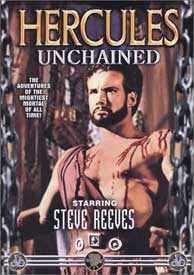 Hercules Unchained (1960; Ercole e la Regina di Lidia, 1959) picks up where Hercules leaves off, with some of the Argonauts of the first film still hanging around with Hercules, especially Ulysses (Gabriele Antonini) who is portrayed as a very young chap. The Hercules of mythology often had a young man on his arm as he was explicitly homosexual (or bisexual), & many sword & sandal epics preserve at least his tendency to have him buddy-up with a teenager. Hercules Unchained (1960; Ercole e la Regina di Lidia, 1959) picks up where Hercules leaves off, with some of the Argonauts of the first film still hanging around with Hercules, especially Ulysses (Gabriele Antonini) who is portrayed as a very young chap. The Hercules of mythology often had a young man on his arm as he was explicitly homosexual (or bisexual), & many sword & sandal epics preserve at least his tendency to have him buddy-up with a teenager.
Also with Hercules' entourage at the start of the film is his wife Iole (Sylvia Koscina again) & a couple others who'll be mostly written out of the story so that Ulysses can get the focus as main companion. Iole, Ulysses, & Herc seem to have set up housekeeping as a menage a trois travelling about by covered wagon, an odd image for ancient Greece, but not too jarring. Iole sings a "Your Hit Parade" style pop tune "The Evening Star" which certainly is a Paint Your Wagon moment.
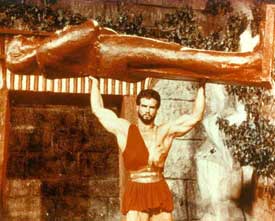 To stop the brewing conflict between two brothers attempting unsuccessfully to share the rule of Thebes, Hercules is entrusted with a treaty, & sets out in jolly mood with his boy-pal to deliver the message. Ditching wife & wagon, he sets out with Ulysses on the important mission. En route, Herc drinks from the Pool of Forgetfulness & falls prey to the lusts of Queen Omphale, forgetting not only Ulysses & Iole, but also his diplomatic mission & his own identity. To stop the brewing conflict between two brothers attempting unsuccessfully to share the rule of Thebes, Hercules is entrusted with a treaty, & sets out in jolly mood with his boy-pal to deliver the message. Ditching wife & wagon, he sets out with Ulysses on the important mission. En route, Herc drinks from the Pool of Forgetfulness & falls prey to the lusts of Queen Omphale, forgetting not only Ulysses & Iole, but also his diplomatic mission & his own identity.
He enjoys Queen Omphales' lustiness, not knowing that she collects men as trophies & when tired of one, she gets a new one & has the old preserved by Egyptian taxidermists & put on display in a cavern museum of past loves. Well, in this case, she falls in "real" love & probably won't have Hercules stuffed, but she does have to fret about him regaining his memory & leaving her, & trickster Ulysses is fast at work to liberate Hercules from the evils of heterosexuality.
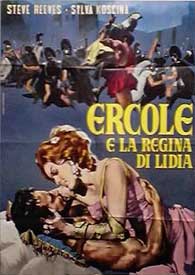 The subliminal homosexuality running through such films is rarely overtly acknowledged, but it often was intentional (as in William Wyler's Ben Hur when Steven Boyd was explicitely instructed to play Massala as a lover spurned by Ben Hur, a subtext never explained to oblivious Charlton Heston). When Ulysses hides in the bushes spying on Hercules making love to Omphale, Ulysses' expressions of jealousy & disgust are marvels of camp performance. The subliminal homosexuality running through such films is rarely overtly acknowledged, but it often was intentional (as in William Wyler's Ben Hur when Steven Boyd was explicitely instructed to play Massala as a lover spurned by Ben Hur, a subtext never explained to oblivious Charlton Heston). When Ulysses hides in the bushes spying on Hercules making love to Omphale, Ulysses' expressions of jealousy & disgust are marvels of camp performance.
For the bulk of the movie Hercules is very happily in Omphales' embrace. Sylvia Lopez is somewhat hamstrung in her role as the powerful queen, having to act through a year's supply of whorehouse make-up, & sitting in her throne at one point in a beauty pageant bathing suit. Given the limitations of her femme fatale sexpot character, she comes off surprisingly well, with a degree of complexity unexpected in such cartoon comic book stories.
As in most Sword & Sandal epics, queens with sovereign power are evil, but helpless princesses needing rescue are good (Princess Iole serves this latter purpose even if placed a little distant in the story), but Lopez makes Queen Omphale more sympathetic than is usual.
Hercules regains his memory when a ship of Greeks happens by. He battles his way through underground passages out of Omphale's palace & returns to Thebes too late to stop the war between the brothers. So he joins in for an action-packed conclusion.
In the end he's happily reuinited with Iole while Ulysses makes some vague reference to Penelope, his abandoned wife in the Illiad & the Odyssey. Though he seems a mite young to already be wed to her, sometimes these scripts have to shout a last-ditch "we're not gay" in order to end happily ever after.
If one had not seen lots of other sword & sandal movies this one might be regarded as a lame & ridiculous relic of post-war post-fascist Italy. It's higher qualities are largely a matter of comparison, as well as the result of Reeves' almost magical ability to look the part. Most muscle builders who've played this role never quite stop seeming like muscle builders posturing as Hercules, but Reeves really becomes the mythic hero.
copyright © by Paghat the Ratgirl
|
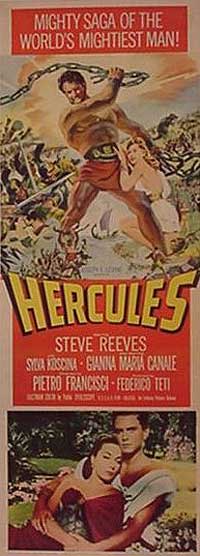

 The film begins with Argoles in a lion fight that is quite appealing as cliche scenes in sword & sandal films go. The lion is obviously tame, but it's even so quite thrilling to watch Vadis instead of a stand-in wrastlin' a lion. The gentle lion was very tolerant being choked & pushed & even wacked in the side with a rubber boulder. There's a less impressive wrestling scene with a Malay sun bear later on.
The film begins with Argoles in a lion fight that is quite appealing as cliche scenes in sword & sandal films go. The lion is obviously tame, but it's even so quite thrilling to watch Vadis instead of a stand-in wrastlin' a lion. The gentle lion was very tolerant being choked & pushed & even wacked in the side with a rubber boulder. There's a less impressive wrestling scene with a Malay sun bear later on. This is kiddy stuff all the way, not the worst film of its type, but with no intention of being any good either. The excellent soundtrack is often remarked upon. It should be transcribed for use in better epics.
This is kiddy stuff all the way, not the worst film of its type, but with no intention of being any good either. The excellent soundtrack is often remarked upon. It should be transcribed for use in better epics. The film is also known as Hercules & the Queen of Samar or Maciste vs. the Moon Men. Absurd though the story is, the men made of stone whom Hercules battles are really quite interestingly designed, despite being amusing in appearance.
The film is also known as Hercules & the Queen of Samar or Maciste vs. the Moon Men. Absurd though the story is, the men made of stone whom Hercules battles are really quite interestingly designed, despite being amusing in appearance. The evil queen of Samar has been providing child sacrifices to the moon people & their stone guards who live in the mountains.
The evil queen of Samar has been providing child sacrifices to the moon people & their stone guards who live in the mountains.
 This one's better than most of the Heroic Fantasy Hercules films. Hercules saves the woman who was imbedded in stone by killing the master of the island, Proteus, who can take any form, but turns out to be killable in the form of a boxing horned six-foot dinosaur. Defeating lizard-boy requires Herc to grab the shlong sticking out of its head & ripping it off.
This one's better than most of the Heroic Fantasy Hercules films. Hercules saves the woman who was imbedded in stone by killing the master of the island, Proteus, who can take any form, but turns out to be killable in the form of a boxing horned six-foot dinosaur. Defeating lizard-boy requires Herc to grab the shlong sticking out of its head & ripping it off.

 To stop the brewing conflict between two brothers attempting unsuccessfully to share the rule of Thebes, Hercules is entrusted with a treaty, & sets out in jolly mood with his boy-pal to deliver the message. Ditching wife & wagon, he sets out with Ulysses on the important mission. En route, Herc drinks from the Pool of Forgetfulness & falls prey to the lusts of Queen Omphale, forgetting not only Ulysses & Iole, but also his diplomatic mission & his own identity.
To stop the brewing conflict between two brothers attempting unsuccessfully to share the rule of Thebes, Hercules is entrusted with a treaty, & sets out in jolly mood with his boy-pal to deliver the message. Ditching wife & wagon, he sets out with Ulysses on the important mission. En route, Herc drinks from the Pool of Forgetfulness & falls prey to the lusts of Queen Omphale, forgetting not only Ulysses & Iole, but also his diplomatic mission & his own identity. The subliminal homosexuality running through such films is rarely overtly acknowledged, but it often was intentional (as in William Wyler's Ben Hur when Steven Boyd was explicitely instructed to play Massala as a lover spurned by Ben Hur, a subtext never explained to oblivious Charlton Heston). When Ulysses hides in the bushes spying on Hercules making love to Omphale, Ulysses' expressions of jealousy & disgust are marvels of camp performance.
The subliminal homosexuality running through such films is rarely overtly acknowledged, but it often was intentional (as in William Wyler's Ben Hur when Steven Boyd was explicitely instructed to play Massala as a lover spurned by Ben Hur, a subtext never explained to oblivious Charlton Heston). When Ulysses hides in the bushes spying on Hercules making love to Omphale, Ulysses' expressions of jealousy & disgust are marvels of camp performance.